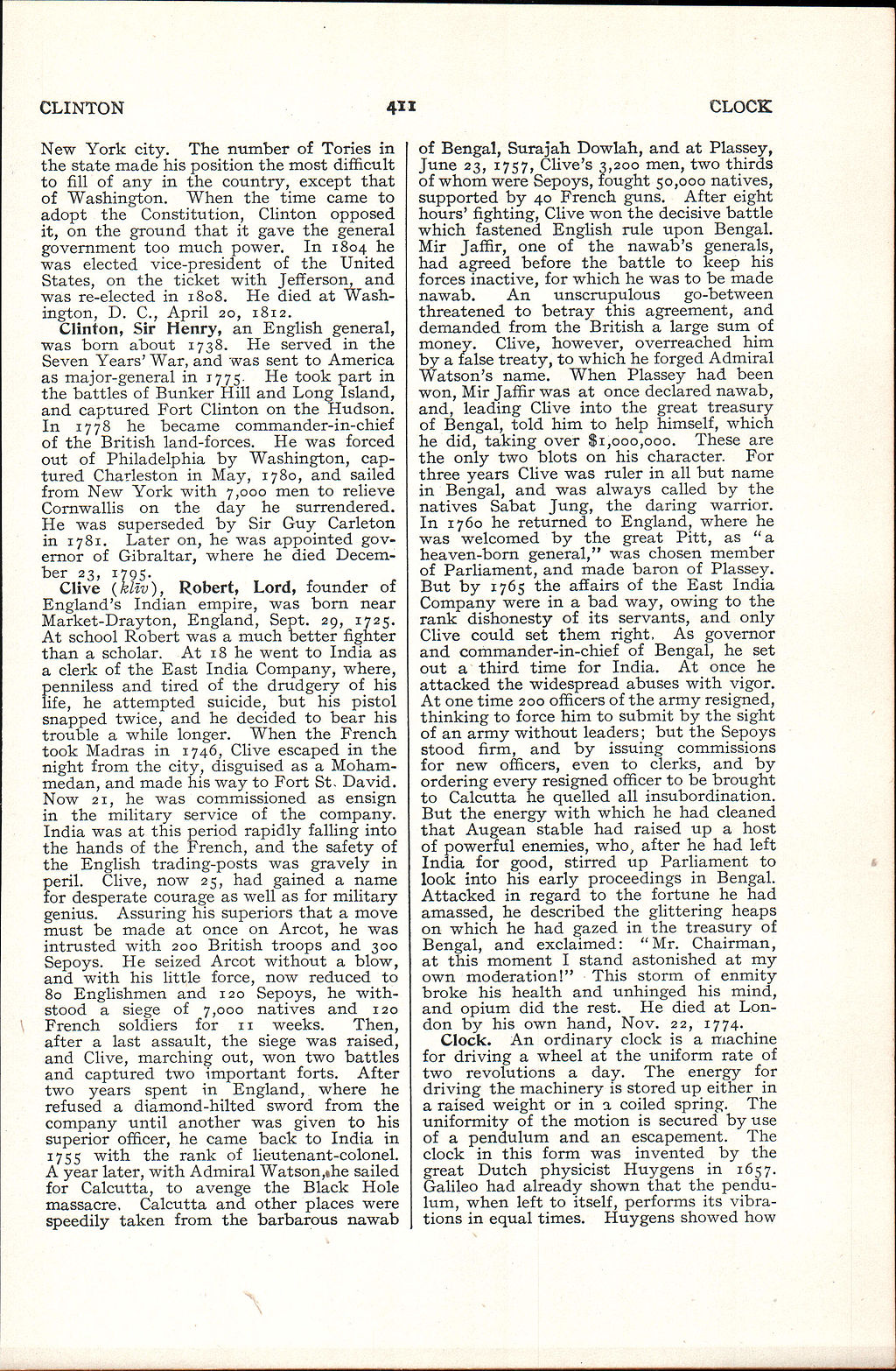CLINTON
411
CLOCK
New York city. The number of Tories in the state made his position the most difficult to fill of any in the country, except that of Washington. When the time came to adopt the Constitution, Clinton opposed it, on the ground that it gave the general government too much power. In 1804 he was elected vice-president of the United States, on the ticket with Jefferson, and was re-elected in 1808. He died at Washington, D. C., April 20, 1812.
Clinton, Sir Henry, an English general, was born about 1738. He served in the Seven Years' War, and was sent to America as major-general in 1775 He took part in the battles of Bunker Hill and Long Island, and captured Fort Clinton on the Hudson. In 1778 he became commander-in-chief of the British land-forces. He was forced out of Philadelphia by Washington, captured Charleston in May, 1780, and sailed from New York with 7,000 men to relieve Cornwallis on the day he surrendered. He was superseded by Sir Guy Carleton in 1781. Later on, he was appointed governor of Gibraltar, where he died December 23, 1795.
Clive (klw), Robert, Lord, founder of England's Indian empire, was born near Market-Drayton, England, Sept. 29, 1725. At school Robert was a much better fighter than a scholar. At 18 he went to India as a clerk of the East India Company, where, penniless and tired of the drudgery of his life, he attempted suicide, but his pistol snapped twice, and he decided to bear his trouble a while longer. When the French took Madras in 1746, Clive escaped in the night from the city, disguised as a Mohammedan, and made his way to Fort St, David. Now 21, he was commissioned as ensign in the military service of the company. India was at this period rapidly falling into the hands of the French, and the safety of the English trading-posts was gravely in peril. Clive, now 25, had gained a name for desperate courage as well as for military genius. Assuring his superiors that a move must be made at once on Arcot, he was intrusted with 200 British troops and 300 Sepoys. He seized Arcot without a blow, and with his little force, now reduced to 80 Englishmen and 120 Sepoys, he withstood a siege of 7,000 natives and 120 French soldiers for n weeks. Then, after a last assault, the siege was raised, and Clive, marching out, won two battles and captured two important forts. After two years spent in England, where he refused a diamond-hilted sword from the company until another was given to his superior officer, he came back to India in 1755 with the rank of lieutenant-colonel. A year later, with Admiral Watson,the sailed for Calcutta, to avenge the Black Hole massacre, Calcutta and other places were speedily taken from the barbarous nawab
of Bengal, Surajah Dowlah, and at Plassey, June 23, 1757, Clive's 3,200 men, two thirds of whom were Sepoys, fought 50,000 natives, supported by 40 French guns. After eight hours' fighting, Clive won the decisive battle which fastened English rule upon Bengal. Mir Jaffir, one of the nawab Js generals, had agreed before the battle to keep his forces inactive, for which he was to be made nawab. An unscrupulous go-between threatened to betray this agreement, and demanded from the British a large sum of money. Clive, however, overreached him by a false treaty, to which he forged Admiral Watson's name. When Plassey had been won, Mir Jaffir was at once declared nawab, and, leading Clive into the great treasury of Bengal, told him to help himself, which he did, taking over $1,000,000. These are the only two blots on his character. For three years Clive was ruler in all but name in Bengal, and was always called by the natives Sabat Jung, the daring warrior. In 1760 he returned to England, where he was welcomed by the great Pitt, as "a heaven-born general/' was chosen member of Parliament, and made baron of Plassey. But by 1765 the affairs of the East India Company were in a bad way, owing to the rank dishonesty of its servants, and only Clive could set them right, As governor and commander-in-chief of Bengal, he set out a third time for India. At once he attacked the widespread abuses with vigor. At one time 200 officers of the army resigned, thinking to force him to submit by the sight of an army without leaders; but the Sepoys stood firm, and by issuing commissions for new officers, even to clerks, and by ordering every resigned officer to be brought to Calcutta he quelled all insubordination. But the energy with which he had cleaned that Augean stable had raised up a host of powerful enemies, who, after he had left India for gpod, stirred up Parliament to look into his early proceedings in Bengal. Attacked in regard to the fortune he had amassed, he described the glittering heaps on which he had gazed in the treasury of Bengal, and exclaimed: "Mr. Chairman, at this moment I stand astonished at my own moderation!" This storm of enmity broke his health and unhinged his mind, and opium did the rest. He died at London by his own hand, Nov. 22, 1774.
Clock. An ordinary clock is a machine for driving a wheel at the uniform rate of two revolutions a day. The energy for driving the machinery is stored up either in a raised weight or in a coiled spring. The uniformity of the motion is secured by use of a pendulum and an escapement. The clock in this form was invented by the great Dutch physicist Huygens in 1657. Galileo had already shown that the pendulum, when left to itself, performs its vibrations in equal times. Huygens showed how
